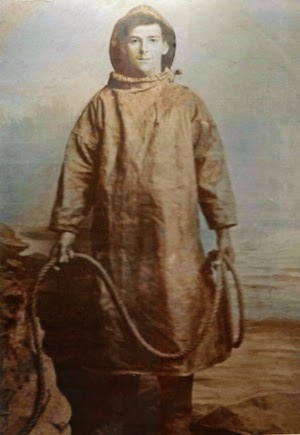I've just been to the Theatre by the Lake in Keswick again to hear Julia Blackburn talk about her new book
'Threads'.
 |
| Threads, by Julia Blackburn, published in April |
I love Julia Blackburn's work - her beautiful combination of memoir, fiction and biography. One of my favourite books is 'Daisy Bates in the Desert', which blends all three to create a three dimensional portrait of the elusive Daisy Bates. Julia talked about how she sees biography as being essentially subjective. The biographer is always there at the centre of the story, part of it, their relationship with the subject central to the narrative. What is happening in the author's life while they are writing the book affects how the biographer sees the subject - the details of one life affects the other. This is something I relate to quite strongly. It's not just that the reader is going to see the subject through your eyes; as a biographer in search of the subject, you go on a journey and come back changed.
 |
| Julia Blackburn |
Threads is the story of Julia's journey to find a painter called John Craske - a fisherman on the Norfolk coast who became ill in 1917 aged 36, while training to go the front in France. He had a strange and possibly psychiatric disorder that rendered him in 'a stupor' some of the time - often bedridden.
 |
| John Craske in his oilskins |
He began to paint, using any materials that he could find - the lid of a bait box, pieces of brown paper, scraps of card, and the paint used for the boats. He had little education and had probably not seen anything other than picture paper images in his life. His paintings were discovered by the writer Sylvia Townsend Warner and her lover Valentine Ackland. Some of them were collected by Benjamin Britten and Peter Pears. They were sold in London galleries alongside Henry Moore and Paul Nash, described as 'primitives'.
When John Craske was too ill to get out of bed, his wife gave him cloth and embroidery thread to work with, and some of his embroideries are very beautiful. He did one long piece, depicting the evacuation of Dunkirk, just before he died in 1943. It remained unfinished and Julia said that she liked to imagine him exiting through the small white space in the canvas.
 |
| Detail from 'the Evacuation of Dunkirk' |
Julia's search was often frustrating. Manuscripts, letters and works of art have gone missing since his death. Few people are left alive who remembered him. In the middle of her research, Julia's beloved husband, Herman, died, leaving a big absence at the centre of her own life. But he had told her that when he died she was to work because 'Only work will get you through'. So Julia went on with the biography, even though 'the nature of the world I inhabited had changed irrevocably'.
Julia's conclusion is that John Craske, too, used work to 'get him through' - that his art was therapeutic in a life marred by both physical and mental illness. It also brings up the question of 'what remains of us?' In John's case there are embroideries buried in cellars, being eaten by moths and paintings hung upside down in locked offices, even pinned to the wall in back rooms - overlooked and unappreciated. Hopefully Julia's book will change that.
Literature festivals are very intense. Shirley Williams was signing books in the foyer, Rory Stewart talking up a storm about the Middle East in the main theatre - the whole building was buzzing. It was exhilarating and exhausting. In the afternoon several of us played truant by Lake Derwentwater.
 |
| L to R, Elizabeth Stott, Alwyn Marriage, me and Ellee Seymour |








Comments
Post a Comment